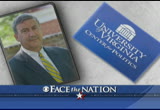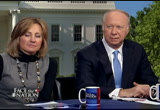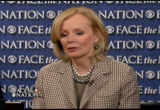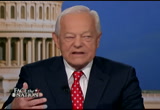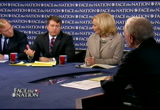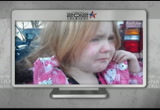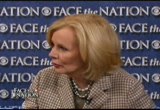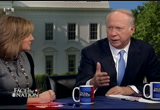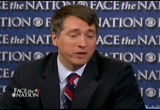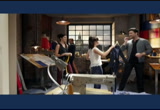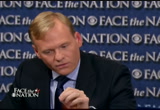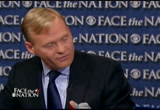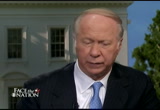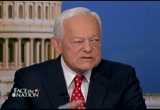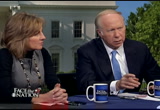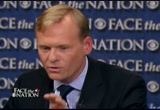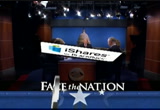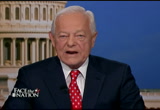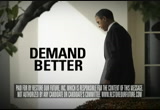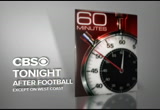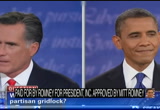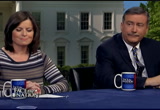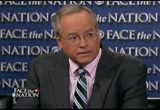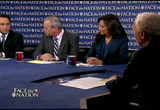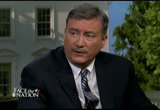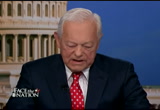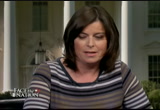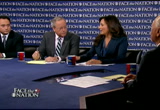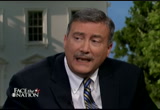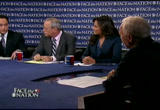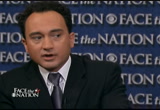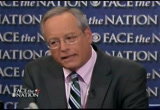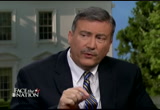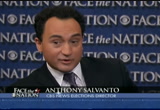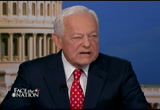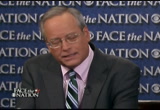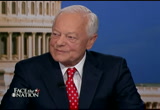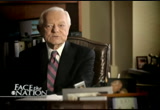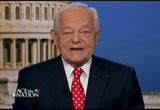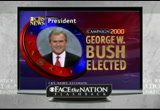tv Face the Nation CBS November 4, 2012 10:30am-11:30am EST
10:30 am
gloof are you ready for some voting? katie perry says she is. >> wisconsin! you ready? >> schieffer: while she was making some smooth moves for the president, kid rock had his republican hat on for romney. >> go, romney. go, ryan. we'll get this done, ohio. >> schieffer: the pop stars and candidates race through the battleground states on one long last lap. >> that's quite a virginia beach welcome. >> hello, nevada. >> new hampshire got me the republican nomination, and new hampshire is going to get me the white house. thanks, you guys. >> schieffer: if there's anything both sides can agree on, this is close and could come down to one state, but which one, florida, virginia, or--
10:31 am
>> i think you may have noticed everyone paying's a lot of attention to ohio. >> schieffer: and them there's the wild card. what will the impact that the super storm that destroyed parts of new jersey and plunkedly the lower half the manhattan into darkness have the race? we've got the latest on hurricane sandy damage,en and this we'll turn to the best of the best political remembers, analysts and race watchers to give us their take on the presidential race. we'll start with peggy noonan of the "wall street journal." dee dee myers of "vanity fair." richard lowry of the "national review." harvard university's david gergen. and our own john dickerson. then we'll talk to stu rothenberg of the stu rothenbe rothenberg political reports. allen stanford of the university of virginia center for politics, democratic pollster anna greenberg, and republican analyst leslie sanchez of the impacto group. and our own cbs news elections
10:32 am
director anthony salvanto. we're coming to the end of the campaign 2012, and we've got it all on "face the nation." captioning sponsored by cbs from cbs news in washington, "face the nation" with bob schieffer. >> schieffer: good morning, again. most of the country is looking forward to election day, or at the least, looking forward to the campaign being over. but in large parts of the northeast, it is still the aftermath of the storm that is in the forefront of many people's thoughts. at least 110 are dead, more than 2 million are still without power. close to 1 million in new york city alone. 80% of new york city subway service has been restored, but it may be days before gas shortages are rer stored and the national guard has been called in to keep order at gas stations. the storm has caused an
10:33 am
estimated $20 billion in damages, plus an estimated $50 billion in economic losses to the region. the state of new jersey was hit hardest, and for more on that, we're going to ben tracy in tuckerton beach, good morning, ben. >> reporter: good morning, bob. this is what so many neighborhoods all along the new jersey shore look like. they're almost frozeep in time. there is really no recovery going on here yet because these areas have just been too dangerous to get into until now. this weekend was really the first time that so many people who live around here are coming back to see how damaged their houses are. many are finding they have no home at all. across new jersey, you're still talking about nearly a million people without power, and that's becoming a real issue, because temperature here's at night are falling into the low 30s, so it's very cold for the people who decided not to go to shelters or who don't have anywhere else to go, trying to ride this situation out. of course, as the days progress here, you will start to see more
10:34 am
debris removal, but so many of these areas are simply too hard to get into. then you have the issue of gas rationing. people are waiting in line for gas. they're trying to get fuel for their gen authors so it's a very tough situation here in new jersey. bob. >> schieffer: thank you very much. we'll turn to the other big story of the week, of course, this final week in the election. and here to give us their thoughts, their predictions, their homes, their dreams, peggy noonan is the columnist for the "wall street journal," speech writer for president reagan. richard lowry wrote this week's cover of "new york times magazine"" magazine and writes for "national review." john dickerson is our cbs news political director. on the other side, dee dee myers, press secretary for president clinton, contributor to "vanity fair," and david gergen, who is at harvard. pecky, let me just start with you. what do you think the impact of
10:35 am
this storm is going to be? did it hurt romney? did it help the president? >> well the impact in the northeast itself has just been very bad. a lot of people suffering up there. some people calling it their katrina in a very unhappy way, of course, in part because it's cold. it's a cold katrina. and people are without heat and electricity. seats very tough. how does it play politically? we'll know in retrospect, i think like everything else, in this race. it is not known at this point how it will play. you can argue that the president looked commanding and like a leader when he came up to new jersey. you could also argue that things are starting to look a little tough in some of the neighborhood neighborhoods in new york and jersey, and so that might work against him. it's hard to say, but one thing i think is probably clearly true and that is the fact of the
10:36 am
storm took the subject matter of mitt romney's closing statements, the end of his campaign, his big arguments sort of snuffed that out a little bit for a few days. inevitably, as we all talked about the storm. we weren't talking about the economy. we weren't doing all of that stuff. so in some way, that may have hurt him. and yet, at the same time, that all that was happening, in westchester, ohio, he was pulling out 30,000 people on a dark, cold night. so balance that out. . >> schieffer: but-- but what you're saying eye don't think anybody sitting at this table would think that the storm would cause new york to suddenly go republican. >> oh, my goodness, no. >> schieffer: or new jersey to be republican. >> no, no. >> schieffer: but i guess the question what we saw in that time period there, does it go out to the rest of the country and have an impact there? what do you, john? >> i think coming out of that, if you look at the question of momentum, which is hard to
10:37 am
define, coming out of that debate in denver, mitt romney had republicans behind him who felt excited about him afresh. it wasn't just that he was the vessel to beating barack obama. they liked him. i think that momentum stays intact. there was another force propel him after that debate, though, and that was undecided voters or soft ones are hadn't yet bought the sale on mitt romney came out of denver doing well with that. that started to dissipate long before sandy hit. so then sort of the president and mitt romney were fighting for that second force. what they needed was a last moment that one of the two of them could be in the front pages, looking like a person who was of the moment and mitt romney lost several days because of the storm to be the man of the moment, and the president, because he was president, was the man of the moment for those late-deciding voters who hadn't been paying attention to the race. they turn on their tvs. that's what they see. i think that to the extent that anybody benefits politically, that probably helps the president. >> bob, there's a reason why of the 10 incumbents who have sought office again since world
10:38 am
war ii, seven have won. powers go with the presidenciy and the moment aalize act presidential-- and i think he did. i think he handled it very well. that you get a bump out of this. i think you get awe hurricane bump out of this and it was part of a bigger tapestry for the week. he had a pretty good week. he had not only the way to handle the hurricane, but the wet chriss from governor christie. who could have imagined. and mayor bloomberg, colin powell's endorsement, which he had okay job numbers on friday. they weren't gpped they weren't bad. and he dodged a bullet. all that together i think gives him the cresting you look for in a campaign right towards the end as you know so well. >> schieffer: rich, do you think it helped or hurt the president? >> i think it helped him at the margins. it interrupted romney's argument. it forced the president for a couple days to act and look presidential, which i think suits him much better than being out there making jokes about big
10:39 am
bird and rom nearbyia and rest of it-- although he has gone back to the sophomoric tone last couple of days, and the robust embrace from chris christie, at the very time romney was trying to make the argument i'm the guy who can work across the aisle better than the president. i'm not sure how long lasting this will be for the rest of the country. for new jersey, and new york, obviously, this will be a big story for a long time. but the news cycle moves so fast. for the rest of the country, tuesday morning it may feel like 100 years ago gee, i agree it was good for the president, and he's if cool in the crisis. that's one of the things people liked about him in this presidency. he seems cool under fire. it reminded them, that's another thing they like about him. his numbers in the northeast spiked quite bit. people there, obviously, felt good about it. those are not swing states so we're not going-- >> new hampshire? >> possibly they didn't get hit as hard. but new york, new jersey, connecticut. but it could drive vote polls up there for him, which could be helpful just not losing the
10:40 am
popular vote. and it was a good week. add to that an endorsement by the "economist" which was unexpected. i think people who are in the middle who maybe voted for the president four year ago and looking for reasons to vote for and against him. you had bloomberg, colin powell, "the economist," governor christie. so it was a reminder that this guy is somebody that they feel good about. >> schieffer: let me just-- i want to play a little video that was sent in to us that i think we-- we have a young woman here who speaks for many americans, maybe even for me. here's what she had to say. >> i'm tired of bronco bamas and mitt romney. >> that's why you're crying? oh! it will be over soon, abbey. okay? the election will be over soon, okay. >> 'k ( laughter ). >> obviously doesn't have a future in political journalism.
10:41 am
( laughter ) >> schieffer: this campaign has gone on. why is it? i mean, is it because it was so negative at the beginning? is that why we're all kind of saying, well-- i mean, i haven't run into anybody who says, "i'm really going to miss these ads." maybe there is somebody out there. >> it has been 18 months. running for president takes 18 months now. it's constant political stuff on tv, in the neighborhood, part of the national conversation. i have never, up until the past few weeks, heard so many people say, "why can't we do it like england?" americans don't normally set around saying-- >> one of the socialist countries over there? ( laughter ). >> they announce an election. six weeks later they vote. thank you very much. one of the odd things about this campaign is that, when looked at from a certain perspective, it looks like it's actually an economic fact more than anything else, and it the local tv
10:42 am
station affiliate recovery act of 2012. they are making so much money because the politicians are buying so many ads. but it's wearing on everybody. i think everybody feels like, "let's vote. wean where we are." >> schieffer: does anybody at the table right here think this is not too close to call right now? does anybody see this breaking substantially one way or another? dee dee. >> i think it's trending very slightly towards president obama. i think that the recent national polls have shown him a little bit-- romney, made up some ground and was leading in most of the national polls for a few days. now either the president is up by one or they're even. i think we see a little bit of movement toward him and he's holding steady in the swing states, particularly ohio. he continues to over-perform in ohio, and nothing has been able to shake voter offs of him. i think if you're-- and i think one of the other indicators is who do people think is going to win? which turns out to be a pretty
10:43 am
good predictor of votes whether in-trade or just voteres, they think president obama is going to win. >> that's true, but i have to tell you, i feel like romney is coming up. i feel like very quietly so many things in his campaign have come together. he has sort of come into his own. he's having these big rallies. i keep watching them on tv. they're very strong. >> those are signs, too. >> yhis case has become-- the case he makes is cogent. it's congratulate. his commercials have gotten good, even as we're all tired of commercials. they've gotten very good. there's stuff going on there. >> picking up from where peggy is, i don't think it's too close to call. i think it's impossible to call. if you look at the polls from afar, clearly, the president has the advantage. he's ahead in most of the battleground states. if he wins the state he's ahead in he's going to easily get the electoral college-- >> schieffer: but they're in the margin of error. >> they're in the margin of error. if you go on the ground, i was in ohio, you hear a different
10:44 am
story than what you hear on the polls, you hear a lot of enthusiasm on the part of republicans. they think they can take this. you can't look at this from 40,000 feet only. >> yes >> you've actually got to be there and get the finger tip deal. >> there's a passion gap among the republicans and democrats. i feel a lot of obama supporters i talk to are somewhat resigned. they mean it but they're resigned. the romney people in the past six weeks have gone from i am anti-obama-- therefore, i'm for romney-- to i like romney. they have become very pro-romney. >> that's what the 51st debate idid. you look at the national expose they're tied. if the challenger and incumbent are tied, you'd rather be the challenger. then you look at the state polls, and it doesn't seem to be that picture at all. and i think some of the state polls are badly skewed. i mean, terror one out the other day that had a democratic advantage of nine points in ohio. if that's really true, ohio would be vermont, and no one would ever campaign in ohio.
10:45 am
it wouldn't be a battleground state. >> schieffer: let's take a quick break here and we'll come back to this in a minute. infrastructure, construction, production. we need it now more than ever. chevron's putting more than $8 billion dollars back in the u.s. economy this year. in pipes, cement, steel, jobs, energy. we need to get the wheels turning. i'm proud of that. making real things... for real. ...that make a real difference. ♪ for real. ...that make a real difference. the data she shares from comments, reviews, and social networks tells a company what to make. what it's made from, how it's shipped, and the way it's sold. some companies are increasing sales up to 20%
10:46 am
by using analytics to tailor experiences to the one person that matters most. that's what i'm working on. i'm an ibmer. let's build a smarter planet. >> schieffer: we're back. john dickerson, i want to go to you. you know, we've been hearing two candidates talk about two very different visions of america as they define it. but if that's so, why is this election so close? >> well, because a lot of people are sorting immediately before they hear the arguments. they're sorting by party. people are more partisan. in states they're targeted and whipped up along partisan lieps. it's so close in these states because you have the left and right going to their parties and there aren't just that many undecided voters left over because they're either turned off and not participate ago the vast majority of people are not participating, and the ones that are participating that are undecided, are still small. that number of voters, small-- we don't know where they are.
10:47 am
i think david is exactly right. it's too close to know what's going on. i think one other thing we have to mention-- i know you'll talk about it in your second panel-- the advantage the president has in the electoral map. if you look at the nine states that are the battleground states, the president has 431 possible ways to get to that magical 270. mitt romney has 76. if the president wins florida, polls suggest and reporting on the ground suggestes, it's going romney's way. but if the president were to within florida, that leaves just one route to the presidency for mitt romney. the president, on the other hand, can lose florida, ohio, virginia, north carolina, and still have a route, not a really great one, but he would still have a route. so that's one of the advantages the president faces and he also has a strong ground game they've been working on for two years, which will help make up for it any lack of enthusiasm he may have among younger voters and-- >> schieffer: let me just say, david gergen, i think the worst of all worlds would be if one of the candidates won the popular
10:48 am
vote and other won the electoral college gee, . >> i agree. >> schieffer: do you see any possibility that could happen? >> theoretically, absolutely. we're in a situation now, where romney, in several polls is either tied or ahead in the national vote, yet behind in the electoral college. yes, charlie cook thinks there's a one in three chance of doing that. i think it goes to the question of governing. the question to me has not been who the win but can the winner govern, do the grand bargain and do the other things to unite this country. the fact is, as it's narrowed down, it's gotten so close, i think governs has become harder. i thought at one point obama could break out and win a big victory, and i thought at one point romney could potentially break out. i don't think the winner is going to have a mandate. i don't think winner is going to have a clear mandate. we're really going to have a
10:49 am
country that remains bitterly and closely divided and it's tough to govern. >> part of that is-- is-- is built into the structure of this. the battleground has shrunk to this hand full of contested battleground state. in 1960, there was an equally close race, soon-to-be president candidate campaigned in 49 states, nixon campaigned in 50 states. all the principles on all sides are in a hand full of states, and it makes by definition the race much more divisive. you have to drive a wedge when it's a 50-50 race. you can't come up with a broad national message that creates a mandate for governing. the process preclude precludes it. >> schieffer: i think so, too. this whole battled ground state thing we're now into i think it just increases the partisanship. i saw a thing the other day that barack obama's margin in 2008 came from 10 counties in united states.
10:50 am
3,000-something, 3,000-plus counties in the united states. if you take 10 counties out of that, barack obama would not have won the presidenciy. the votes are so concentrated and i think naitself lead to this partisanship. >> it's a function of the geographic and cultural division of our politices, and on what's going to happen next, david, i think you're basically right. the president chose to run an almost entirely negative campaign based on destroying mitt romney from beginning to the end. but his second-term agenda is based on working something out with the congressional republicans. and if he wins in these circumstances a very narrow victory, probably having run this kind of campaign, republicans aren't going to be more pliable. they're going to be less so. >> you think they're be more resistant if he wins? they'll be more resistant in the house? >> yes. and romney on the other hand getting his stuff done depends on having a republican senate which looks like a dicey proposition at the moment. the only way a republican senate
10:51 am
is going to happen is if romney wins and all the states tip in one direction. >> if you look at some of these senate racees, they're happening in states that are red or blue but you have the opposite team winning. if you look at indiana, arizona, missouri, massachusetts, states either very blue or very red, the senate races are quite close. that tells us in the president yool game where the math is to get you to 270, you spend your time in the close states, you can't waste time in missouri. president obama did in 2008. he got a gargantuan last rally. didn't do him any good. he lost in missouri. if you're a senate candidate who spending time in miy as a candidate and have a candidate who steps in it as todd akin did, you have a chance of winning that state. while on the presidential map missouri looks red. in the senate race where you can talk to the voters as a democrat, you can do okay. the same may be true in massachusetts. a very blue state where you've got a republican who is talking about local issues who can win. but in the presidential race, you don't have the time to spend in those state because they
10:52 am
won't get you to 270. >> schieffer: rich, in 30 seconds, tell me when we'll be saying around this table next week. you don't have to predict who won. whoever won, where do you think he would have won? >> i think if romney wins, which i think will happen, is going to be because of his message. it's a message becaused on change, based on hope and optimism, and based on actually having a plan. that's the closing argument he's pounding away on. >> schieffer: dee dee, what do you think? >> i think we'll be talking-- this has been a very mechanical race. i think we'll be talking about president obama's ground game, how he identified his voters, getting them to the polls and i think if he wins, that will be the difference. >> schieffer: all right, thank you all. this is a lot of fun to talk to you. >> thank you. >> schieffer: back in a moment in some of my own thoughts. i'm a conservative investor. i invest in what i know.
10:53 am
i turned 65 last week. i'm getting married. planning a life. there are risks, sure. but, there's no reward without it. i want to be prepared for the long haul. i see a world bursting with opportunities. india, china, brazil, ishares, small-caps, large-caps, ishares. industrials. low cost. every dollar counts. ishares. income. dividends. bonds. i like bonds. ishares. commodities. diversification. choices. my own ideas. ishares. i want to use the same stuff the big guys use. ishares. 9 out of 10 large, professional investors choose ishares for their etfs. introducing the ishares core, etfs for the heart of your portfolio. tax efficient and low cost building blocks to help you keep more of what you earn. call your advisor. visit ishares.com. ishares. yeah, ishares. ishares by blackrock. call 1-800-ishares for a prospectus which includes investment objectives, risks, charges and expenses. read and consider it carefully before investing.
10:55 am
... what should we invest in? maybe new buildings? what about updated equipment? they can help, but recent research shows... ... nothing transforms schools like investing in advanced teacher education. let's build a strong foundation. let's invest in our teachers so they can inspire our students. let's solve this. >> schieffer: some of you watched the debate may remember they closed the evening with the words from my mother who said, any vote, it makes you feel big and strong. she was the driving force in my life and she she really believed that. to her it was a qualifier. if you don't vote, you have no root to criticize what happens after the election. she was not bashful about exercisin exercising that right, and i feel the same way, but i take it a step beyond that. i like to vote because it is so much fun.
10:56 am
and here's a confession-- sometimes voting against someone i don't like is more fun than voting for someone i do like. and here's the best thing of all-- you can vote for or against someone for the best of reasons, the wrong reasons, or no reason at all. it is your vote, and you can do with it as you choose. in fact, you can waste it if you like. you can tell everyone or no one. my wife instructs me not to tell her who i vote for. she's afraid i might disappoint her. so i've never told anyone how i voted. until now inspect. in this new spirit of full disclosure i'm going to confess i once voted for walter cronkite, but i'm not saying when. basement.
10:58 am
11:00 am
>> schieffer: welcome back to "face the nation." for in in-depth analysis we will turn to our second panel. these are pollsters and political experts. leslie sanchez is a republican strategist. she runs the impacto group. stu rothenberg is one of the most respected political analysts in the land. he puts out the rothenberg political reports. anthony salvanto is the cbs news political director. he's the director of elections. anna greenberg is a senior vice president of the democratic polling firm greenberg, quinlan, and roster upon and last but not least our old friend larry sabato, the political guru of the university of virginia center for politics. stewart, let me talk to you. and you i talked last week. >> we did. >> schieffer: you said, don't
11:01 am
look at me. i have no idea who is going to win. and this is what you do for a living. right now, how do you think this thing is breaking on this last weekend? >> i think the popular vote looks even or close to even, bob. i think anybody would be crazy to confidently predict how that's going to go. i still think the electoral college is easier for the president to get to 270. it's not impossible for governor romney, but all the pieces have to fit together for him. there are a number of must-win states so it's more difficult. >> schieffer: talk a little bit about that. why? >> when you look at the differences between the national polling and state polling, it's remarkable. republicans have some problems with the state numbers. they say most of the state polls are too democratic. the samples are too democratic. and in their heartes, truly believe that the romney folks and most republican strategists believe they have at least an even-money chance on this. but when you look at the dispassionate polls, the independent polls, the media polls, they seem to mirror the democratic numbers a bit more. so it's easier for the president.
11:02 am
the president has a slight lead, apparently, possibly, in ohio. and then you look at the other states. they're either even or a slight advantage to the president. certainly the big states, wisconsin, and ohio, maybe even virginia. it's harder for governor romney. but it's close enough that i think many of us are going to wait and see what-- how the vote counting goes. >> schieffer: anthony, you do all this work for cbs news. you're in charge of our poll and all of that. how do you see this thing breaking down? what do you, the closest of the battleground states are right now? >> certainly, certainly virginia is neck and neck. that's a toss-up. i think colorado is razor close. i think wisconsin is really close walz. you know, we talk a lot about ohio. it's obviously critical. but let's not forget somebody has to take two or three, i think, of those, also, to get over the top. you know, stewart said something interesting, too, that i want to pick up on about these polls-- because all of this is about those state polls. so much of the argument this
11:03 am
year has been about the composition of the polls, which means the composition of the electorate. there are too many older folks, too many young, too many democrates, too many republicans. but i think that tells you all of this comes down to turnout. the pollsters are trying to get a handle on-- everybody is trying to get a handle on who is actually going to show up? is this going to look demographically more like 2008 or 2004? that's what's going to decide this. franfrankly, there are very few, if any, undecided voters left. >> schieffer: larry, you're the world's foremost expert on virginia politics? >> there are three totals to. ups at my shop-- virginia, colorado, new hampshire. we called all the other states, and we think the president's likely to win with 277 to 303 electoral votes. but virginia is very, very close. and i think it's a lot closer than either side expected. and just to address what stu and anthony were saying, i have a
11:04 am
lot of good contacts there, obviously. i've lived there all my life. and they really do believe what they're saying, and the republicans swear to me and they've shared their numberes, romney is up a point or two in their tracking polls. the democrats are done the same thing. president obama is up a point or two in their polls. now, i don't think virginia's representative of the country. i do think the president has an edge in ohio. i expect him to win ohio. i expect him to win wisconsin, i think he's going to win iowa, and frankly, given democratic base in the other states, that's all she wrote. >> schieffer: let me go to you, lesley. i want to talk a little bit about pennsylvania. a lot of us were putting that pretty much in the democratic column a good way backs in this campaign, and now in the last week or so, you've seen the romney folks putting some money in there and saying they really think they have a chance. i'm not convinced whether they think they have a chance or whether they want us to think they have a chance. all of these things in pol tibs
11:05 am
you always have to put it into context. what is the situation there? why are they putting this money in there? >> i would say the victory team and the romney team feel very confident that they-- they understand a couple of things we've talked about here. yes, we're talking about pennsylvania, to your question. but looking at ohio and virginia, i think they're much more competitive. they're more competitive because you're look at the fact that governor romney has closed that gap postconvention. you're seeing a lot more independents move, and they have been since 2009 be but move over to the republican alternative. and this, again, comes down to being a referendum on the president. as much as everybody wants to break it down and look at polls and statistics and small percent annuals, individuals are deciding-- these swing voters-- do they want four more years? and i think consistently, they're showing that there's better alternatives for governor romney. >> schieffer: you really think you have a chance in pennsylvania? >> look, if you look at money, in terms of money and time, the most valuable resources, the republicans are putting
11:06 am
significant dollars there. they're winding that upping it-- look where they're aiming, not only working class white, but suburban, suburban womens, and the resources are there. the ground game's there. they're going to tell you there are 150,000 volunteers. they're doing significantly more in terms of direct voter contact. all of that makes a difference on election day. >> schieffer: anna, didn't david axelrod say he'd shave i had mustache if they lost pen pep. >> and a lot of others, too. >> schieffer: what do you think about it? >> i don't think they will win pennsylvania. i think they have money to burn. there is so much outside money the romney campaign is flush and i think they're making obama spend money there, but in particular, looking at the suburban voter voters in the philly suburbs and college women, that's an area where all of the issues are really problem atec for romney and the republicans. so not only do i think pennsylvania is pretty reliably blue. i also think they have extra
11:07 am
problemes, if you will, in the suburban areas because they are so out of step on social issues with those voters. >> i'm really glad-- if you don't mind-- that you mention that. the democrats have completely over-played their reach to women. not only did they patronize women by lobbying specifically at social issues, talking only about abortion and contraception. when you interview these women they are talking about a much broader sense of economic issues. will i have the financial security to take care of my aging parents? will my children be able to go to college as we planned? it is not this redefined sense of looking back to what women's issues are but looking forward because we are the bread winners. >> with all due respect, there is no data that supports that point. if you do polling and test the issues-- which i've done in many of the races i work in and many of the races i work in were doing things on tv and mail-- independent women are offended from everything from aikin to murdoch and it speaks directly to womenally economic stand. and i think you'll find at the end of the election, that issues
11:08 am
didn't define the election, but for some voters, especially the independent women, who are the holy grail in this election, are very important. >> let me get away from women-- not that i want to get away from women. what we saw in 2004 here, all three of these stase were really close. john kerry won between two and four percent annual points. they're competitive races. if we have a competitive race-- and we are-- it's not surprising these are real contests. the problem for the republicans is getting over that hump. yes, they can get to within two or three points in these states but winning them is awfully hard. are you really going to tell me-- lesley, maybe you will-- that mitt romney is going to win pennsylvania but have a hard to winning ohio, and colorado. >> to the point of pennsylvania, i think it's a much more difficult task, there's no doubt. let's just say the scenario conceding that, new hampshire, give iowa, wisconsin, minnesota,
11:09 am
the competitive battleground the republicans are looking at, at the top, ohio and virginia. because-- >> schieffer: larry, talk a little bit. it's your job, you figured it all out-- >> no, we haven't figured it out. we guessed. we guessed to this point, bob. >> schieffer: i guess i have to ask the following-- ( laughter ) tell me what you found out. >> well, essentially, you know, we rely not just on polls but also the election models and punditzy that comes out of the political science-- stu you're a political scientist-- >> so is anne. >> that's right, anne is, too. the truth is, history matters enormally. look, you can see pennsylvania getting close. i can also see minnesota getting close. can't the republican get the last one or two porsage points. yo percent points. you have to look at the history of the states. night poll way markin of error of three or four or 5% on any
11:10 am
given day. there's more stability to this system than we're acknowledging. >> schieffer: you said in the battlegrounds-- where do you see the battleground states? >> i see florida going to romney. although, i've got to say, romney is closer to losing florida than obama is close to losing ohio. now that tells you something. i think north carolina is romney's. i think, as i said, wis consin, ohio, and iowa are all going to go to obama. new hampshire is tight as a tick, it colorado is tight as a tick, nesad is obama's. and there we are. the rest aren't competitive. >> i would say this. as we look at this on election night early on, even if these states are close, even if obama wins a pennsylvania, minnesota, michigan, we may not know that right away because they're really close. i think they only break if there's a very giant wave, and frankly, none of us see that coming. >> schieffer: you think we're going to be there late. >> oh, yes. >. >> it depends what happens in
11:11 am
florida. i think florida say toss-up, and if you look at the early vote, if if leans pretty heavily democratic and in a lot of the states where obama is ahead by a point or two, the early vote is democratic. the republicans caught up, but it's still democratic leaning. >> schieffer: my sense is we'll be waiting to see what in fact naps nevada and especially in colorado. >> i agree with you. once we get ohio, once we know ohio, then we've got to look out west. they need something else to go over the top. but we'll also be there late because of the senate. i don't expect we'll know senate control until after we see north dakota, and montan as well. >> arizona. >> and arizona as well. we've got a late and i think exciting night ahead. but some of these, especially all of these states, too, that we've been talking about, their counts are going to come in over the course of a couple of hours. so we'll have some suspense building there. >> schieffer: let's take a little break here and we'll come back and talk about this some
11:12 am
11:13 am
>> schieffer: this race has been close from the very beginning, but stu you saw a shift about a week ago. >> about a month ago, bob. right before the first presidential debate, it looked like when you fast forwarded a month it looked like we would be sitting here and know who was going to win. the first debate fundamentally altered the debate, fundamentally railed some questions with swing voteres, white working class. >> reporter:s about president, about his enthusiasm, energy. but also it changed the image and impression of mitt romney. suddenly he became not the ideologue but more the problem solver, the business guy. not simply the conservative tea party republican. most of us don't ever think he was a conservative tea party republican, but the democrats is
11:14 am
that you image. and that debate i think fundamentally changed things. if you look at the most receipt polls in terms of image, mitt romney'mitt romney's favorable is significantly up. a number of polls have him virtually even with the president. romney's reputation and his ability to alter the initial picture of him, the democrats ran, you know, ads over the summer and going right before the conventions, mitt romney doesn't care about you-- the debate changed everything. >> schieffer: so why is that, larry? >> well, it was because, i guess, what, a couple of hundred millions dollars was spent defining romney in negative terms, and people saw him up close, and said, "gee, he's not such a bad guy" so the real life contradicted the television advertising. but, bob, just to add a footnote here. i agree with what stu said about the first debate but i look in close races for last-minute trend that may lift one candidate a point, a critical point. what happened this last week? hurricane sandy lifted president obama because he was
11:15 am
presidential and mitt romney was forced off the stage for three days. and the president donald a bullet on jobs on friday. those two things combination i think pushed obama up and over the top in several of these very close states. >> schieffer: anna. >> first of all, mitt romney had to run as a right win party guy in the primary. it wasn't just democratic money. he defined himself that way and was republican program was as conservative as it's been. it wasn't just democratic money that created that image. i think though to follow up on larry's point, i think that the economy, people actually-- if you look at people's perception of the economy and the number of people who say it's getting better, worse, or the same, the better number has been going up. if you look at people's assessment of the economy, consumer confidence has been going up. this jobs report is not dodging a bullet. it's consistent with what most americans think about the economy. it's better. they don't think it's great.
11:16 am
but we are in a much better place, even in the direction of the country. we have a majority of people saying the country is going in the wrong direction but it's about 15 point down from 2010, 2008. i think the jobs report built a narrative that they feel the economy is getting better. >> schieffer: do you think the storm hit mitt romney, lesley? >> i think it-- it beved the-- benefitted the president. let's put it that way. i agree, he looked presidential governor christie looks good. the sad case is when you see true bipartisanship, people were skeptical. beam were like why are they work together? that's the way the country is supposed to work. i think it's mesh're america coming together for best interest of america. so very good. you know, now that you have the residual effect of the storm, the people anticipate the recovery is going to be more difficult. i agree with peggy noonan, that you're not going to know until
11:17 am
later where the blame and such falls. to the point of the economy, i think it's very important-- there are some basic past statistices, important thing-- 1800 people a day are losing their homes in foreclosures. you have these families very concerned about financial stability and taking care of their parentes, taking care of their children. these are the ones that are saying these are the policies of president obama that put us here. i like him personally but i don't necessarily agree he's going to be part of the solution and he has yet to offer one word of solice or solution that gives them that relief. that's why the momentum, i would do you mean with election of 2010, is with republicans, closing gap in colorado, in virginia, and in ohio. and that's what's tilting it. >> schieffer: anthony? >> on the point about the economy and bipartisanship, it's interesting. even on what might be objective facts, we see a partisan split. most democrats think the economy is doing okay. most republicans in polls say it's bad. they can't even agree on that. but it's also part of why this thing itself is so close to 50-50 today.
11:18 am
when we look at the exit polls tuesday night and talk about views on the economy, remember, there's a lot of that partisan coloration in there, too. >> and i would simply add to that, i agree, entirely-- i think we could have predicted this. i think most of us did expect this kind of election a year or two ago. why? without looking at the polls over the last six months. why? because the country is evenly decide dyed by republicans and democrats, liberals and conservatives, folks on the coast, and phobs in the middle. some of the people in the middle think like folks on the coast if you live in asheville, north carolina, or austin, texas. this is the country. >> schieffer: what about-- let's talk about the congress, the house and the senate. i think most people think the house is going to stay republican. 53 democrats in the senate now, 47 republicans. is that going to stay about same? >> yes. i think it's going to be almost exactly the same. which is amazing because the democrats have far more seats to defend than republicans do this year, and you had more democrats retiring.
11:19 am
was in a great opportunity for republicans. if i had to guess, i would say democrats would end up with 52 or 53 seats. they have 53 now in house. you're going to get about the same number of republicans you've got now. it relates to the 50-50 country. we could end up with a 50-50 nation and a status quo election with the incumbents essentially re-elected in all three parts of the federal government. >> schieffer: what's kind of interesting about that, i can't recall a time in my lifetime when the approval rating for the congress has been lower than it is. and yet we wind up with the same cast of cairns. characters? >> i think it's clear democrats blame republicans, republicans blame campaigns. everybody can agree they don't like congress, although congress' numbers are starting to inch up the past few weeks but still held in low reguard. but each guy is blame the other guy. i think larry is right. we're going to see little change in the house, the senate, we're anywhere from no change to
11:20 am
republican game of two or three seats. and it's-- the senate is disappointing to the republicans. they're not going to win a seat in missouri they should have won. they may lose a seat in indiana. >> redistricting had a lot to do with that, too, as you have written about so well. republicans consolidated their gains and democrats hung on to theirs and there aren't that many competitive districts in the. >> there are also some structural problems. in 2008, the seats the democrats won and then lost in 2010 are basically republican seats. i think the democrats will pick up two to four, maybe six seats tops. it's just going to be a long slog back to majority. >> schieffer: let's end this panel as i did the other one. i'll start with you guys here on the end. what will we be saying next week around this table and why will we say the person who won, won? >> that the momentum was definitely a part of the 2010 election. for republicans it was a continuation, 24 months later, moving to change the government. >> you know, it will be obama
11:21 am
re-elected because of the economy and the status of women in society. >> schieffer: all right, that settles it. it doesn't settle it. i'm told we have 30 seconds more. ( laughter ) >> oh, gosh! >> i think next week we'll be saying boy that was an awfully late night, bob. >> schieffer: larry. >> quickly? >> status quo election and we're faceag divide, tough government. >> divide government, and how are we going to it. >> schieffer: we'll be back with our "face the nation" flashback and it's a good won. stay with us.
11:23 am
>> schieffer: uponning this could be one of the closest elections ever, and that it could come down to one state, may excite you, but it sends a shiver up the spine of those of us who were there election night 2000. we'll never forget that one and it's our "face the nation" flashback. we knew from the start it was a close one that probably hinged
11:24 am
on florida. >> it's generally considered to be so close that it may be a long while before anybody's able to call it. >> schieffer: if only we had stopped there, but, no. just before eight:00 all the new year's called florida for gore. >> abc news projects a al al gore wins the state of florida. >> cnn announces that we call florida in the al gore column. >> florida goes for al gore. >> schieffer: in a matter of hours, we all took that back and said florida was too close to call. >> you will have 30,000 absentee ballots that aren't going to be counted until tomorrow. >> schieffer: just after 2:00 a.m., we reversed our original call and said bush had won florida and was the next president of the united states. >> bush wins. >> schieffer: less than two hours later, we retracked that call and said the election was just too close to call. >> this is no longer an
11:25 am
election. it is like "alice in wonderland." we get stranger and stranger as alice said, fiquote her correctly. >> she's as good a person to quote right now as anybody i know. >> good evening. >> schieffer: so al gore won the popular vote but it would be well into december until the supreme court ruled that george bush had won displrd with it the presidenciy. >> i do solemnly swear... >> schieffer: our "face the nation" flashback. i'm a conservative investor. i invest in what i know. i turned 65 last week.
11:26 am
i'm getting married. planning a life. there are risks, sure. but, there's no reward without it. i want to be prepared for the long haul. i see a world bursting with opportunities. india, china, brazil, ishares, small-caps, large-caps, ishares. industrials. low cost. every dollar counts. ishares. income. dividends. bonds. i like bonds. ishares. commodities. diversification. choices. my own ideas. ishares. i want to use the same stuff the big guys use. ishares. 9 out of 10 large, professional investors choose ishares for their etfs. introducing the ishares core, etfs for the heart of your portfolio. tax efficient and low cost building blocks to help you keep more of what you earn. call your advisor. visit ishares.com. ishares. yeah, ishares. ishares by blackrock. call 1-800-ishares for a prospectus which includes investment objectives, risks, charges and expenses. read and consider it carefully before investing.
11:28 am
>> schieffer: that's it for us today. we hope you join us tuesday night starting at 7:00 p.m. eastern for our cbs news election night coverage. then we'll see you here next sunday on "face the nation," and find out how smart we all were, or not. captioning sponsored by cbs captioned by media access group at wgbh access.wgbh.org
291 Views
IN COLLECTIONS
WUSA (CBS) Television Archive
Television Archive  Television Archive News Search Service
Television Archive News Search Service  The Chin Grimes TV News Archive
The Chin Grimes TV News Archive 
Uploaded by TV Archive on

 Live Music Archive
Live Music Archive Librivox Free Audio
Librivox Free Audio Metropolitan Museum
Metropolitan Museum Cleveland Museum of Art
Cleveland Museum of Art Internet Arcade
Internet Arcade Console Living Room
Console Living Room Books to Borrow
Books to Borrow Open Library
Open Library TV News
TV News Understanding 9/11
Understanding 9/11

